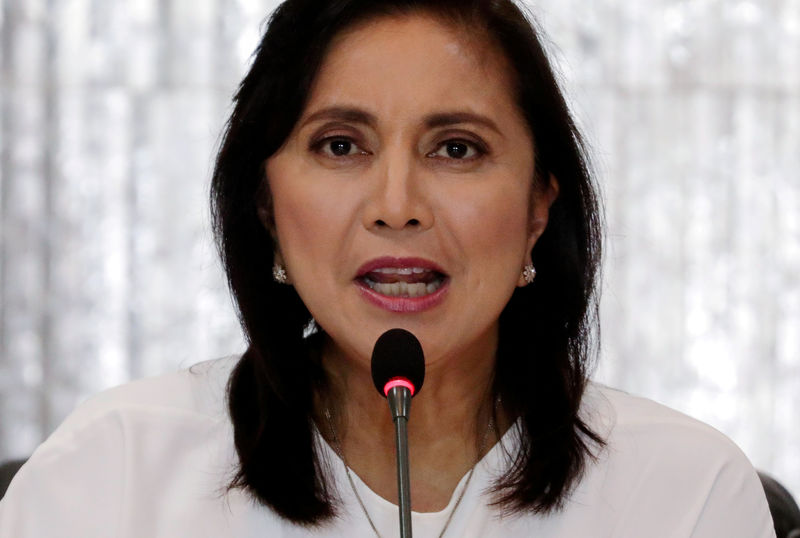By Martin Petty
MANILA (Reuters) - Philippine President Rodrigo Duterte on Sunday fired his chief political rival from the role of "drugs tsar", accusing her of embarrassing the country by trying to draw undue international attention to his war on drugs.
Leni Robredo, who is also vice president and was elected separately to Duterte, accepted the role on Nov. 6, against advice of her allies, who said it was a trap designed to discredit her.
Robredo has angered Duterte by criticizing what she called "senseless killings" during a crackdown on drugs that caused international alarm, due to the thousands of mostly urban poor killed in what police said were drugs busts that turned into shootouts.
Duterte's lawyer and spokesman, Salvador Panelo, in a statement said Robredo had overreached by seeking classified information, and by meeting with foreign entities opposed to Duterte's crackdown.
"The vice president resorted to unduly baiting international attention," Panelo said, adding that she had met United Nations and U.S. embassy officials who "know little or none at all about our situation, other than their own bias or unsubstantiated prejudgment."
He said her pursuit of confidential law enforcement information could not be regarded as being free from malice or manipulation.
"Essentially, what the vice president has done is to embarrass our country," Panelo added.
Robredo's spokesman said she would make a statement on Monday.
Human rights groups have accused the police of systematic executions and cover-ups. The government has rejected that.
Activists say Duterte has incited police to kill in his frequent public statements, including promises to protect police accused of murder, and to kill 100,000 dealers.
He once said he would be "happy to slaughter" millions of addicts. His office has dismissed his remarks as hyperbole.
The United Nations Human Rights Council in July approved a resolution to investigate the Philippines, and the International Criminal Court is conducting a preliminary examination of allegations of crimes against humanity.
The government accuses both bodies of bias and interference.
Robredo struck a nerve with Duterte when she said his police-centered strategy had failed, remarks made during an interview with Reuters, and in subsequent media appearances.
Butch Olano, head of Amnesty International in the Philippines, said Robredo's bid to stop the bloodshed was never given a chance.
"Vice President Robredo was able to confront the government with the staggering scale of its own crimes. That is why she was sacked," Olano said in a statement.
Senator Risa Hontiveros said Duterte was worried about what Robredo might have done.

"Not only they were not ready for her, they were scared," she said.